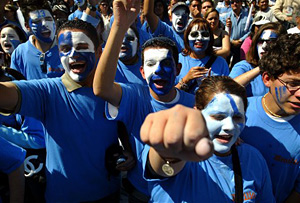 |
 |
 |
 News Around the Republic of Mexico | May 2006 News Around the Republic of Mexico | May 2006  
Mexican Elections Arouse Suspicions
 Prensa Latina Prensa Latina


| | The three leading candidates in Mexico's July 2 presidential election all agree on one point: In a nation where two-thirds of the 103 million people are under 30, the youth vote is critical. (AP) |
Mexico - La Jornada newspaper published Tuesday that elections in Mexico are suspicious, "given the evident and antagonistic bias of the federal government."

Through its propaganda in favor of ruling candidate Felipe Calderon, the government of President Vicente Fox has substantially damaged the "uncertain and precarious democratic institutionality," La Jornada editorialized.

The paper cast doubt upon Fox's address to the nation, where he made "certain legal inaccuracies" such as entitling himself to be among those who should bring elections to a successful conclusion.

According to the Mexican law, it is the Federal Election Institute that should engage in that task.

However, La Jornada published the federal government still has time to clear up doubts and uncertainty surrounding the transparency and legitimacy of the July 2 elections.
Tribunal Rules Negative Ads Defamatory
Jonathan Roeder & Arturo Zárate - The Herald Mexico

The top electoral tribunal ruled on Tuesday that a series of commercials attacking presidential candidate Andrés Manuel López Obrador must be taken off the air.

A majority of the justices sitting on the tribunal, known by its acronym as the TEPJF, ruled that phrases such as "López Obrador is a danger to Mexico" and "López Obrador allowed these crimes" were defamatory.

The majority of these spots were paid for by the National Action Party (PAN), although one ad, which says "lying is a habit" for López Obrador, was financed by the Institutional Revolutionary Party (PRI).

The justices argued that campaign advertisements should be dominated by a "canon of veracity" and that freedom of expression can be limited in political discourse.

"When one candidate paints his adversary as if he were a demon, and the other responds likewise, who is going to want to participate in this political hell?" said Leonel Castillo, chief magistrate on the TEPJF. "No one. This is about having political debate that is civilized and has principles in veracity, objectivity and rationality." The criteria set by the court on Tuesday states that parties may not use "diatribes, infamy, slander, insults, defamation or denigration" against their opponents.

The PAN, which has ridden the success of the negative advertisements in recent weeks to a lead in the polls over López Obrador, pledged to appeal the ruling to the Supreme Court.

In a press conference, PAN spokesman César Nava Vázquez said the TEPJF decision violates freedom of expression.

"We will call on the nation´s highest court to decide which criteria should prevail: That which tries to quiet us, and censor parties and their candidates, or the criteria of freedom that the Supreme Court has traditionally upheld," he said.

The Supreme Court ruled against the President Vicente Fox, of the PAN, in April, arguing a series of advertisements trumpeting his administration´s achievements could alter the election´s outcome.

Meanwhile, the PRD´s representative before the IFE, Horacio Duarte, celebrated the decision and said the party would remain vigilant to ensure it was enforced.

Federico Estevez, a political scientist at the Technological Autonomous Institute of Mexico (ITAM), said the ruling, coupled with the nation´s ambiguous defamation laws, sets a dangerous precedent.

Due to a very loose definition of defamation in Mexican law - even statements that are true can be considered defamation in some cases - the TEPJF decision will have a chilling effect on political debate, he added.

"This is weird. This is destroying democracy in order to save it," Estevez said. "Eventually it could apply to speeches and debates and news conferences."

Other analysts, such as Denise Dresser, also of the ITAM, have suggested that the negative campaigns have distracted the public´s attention from constructive proposals to character attacks on López Obrador.

López Obrador led the polls for over a year before being overtaken recently by PAN candidate Felipe Calderón. Roberto Madrazo, of the PRI, is in third place. | 
 | |
 |



